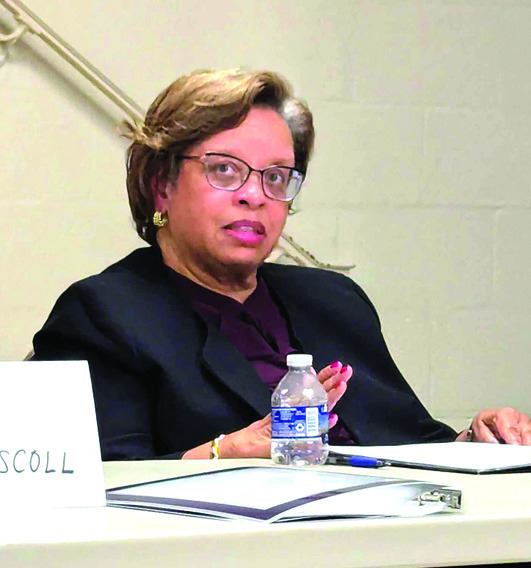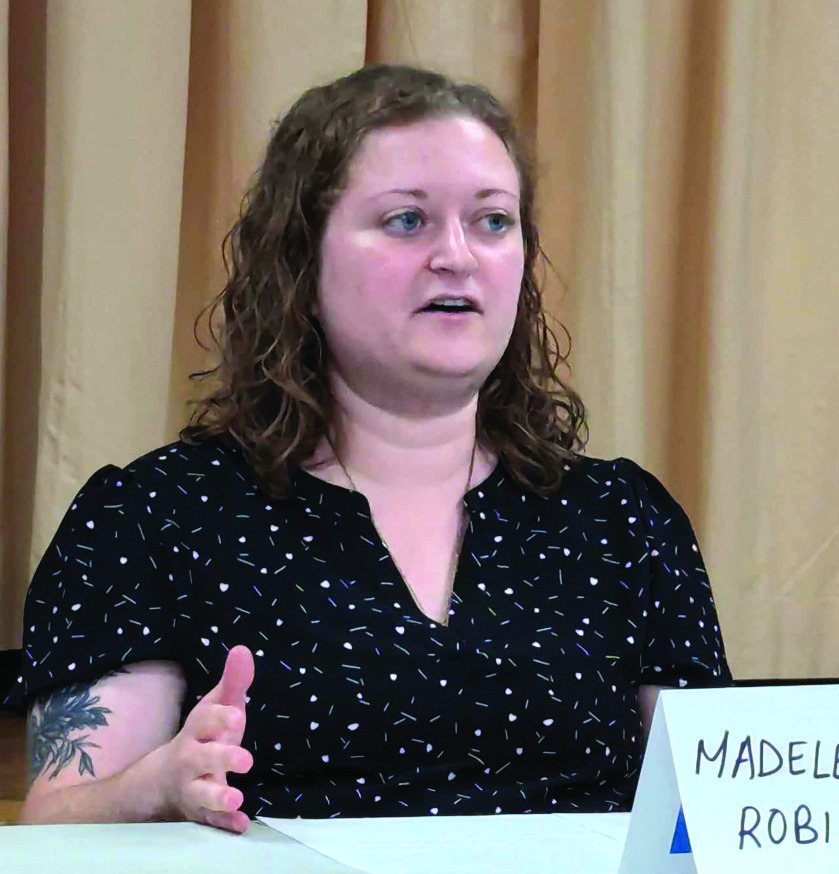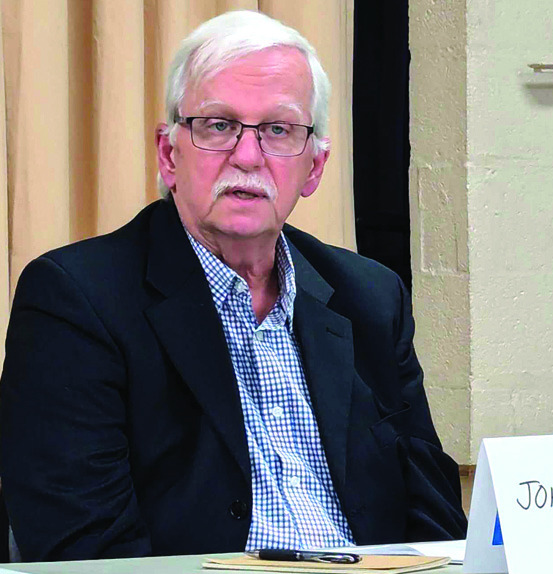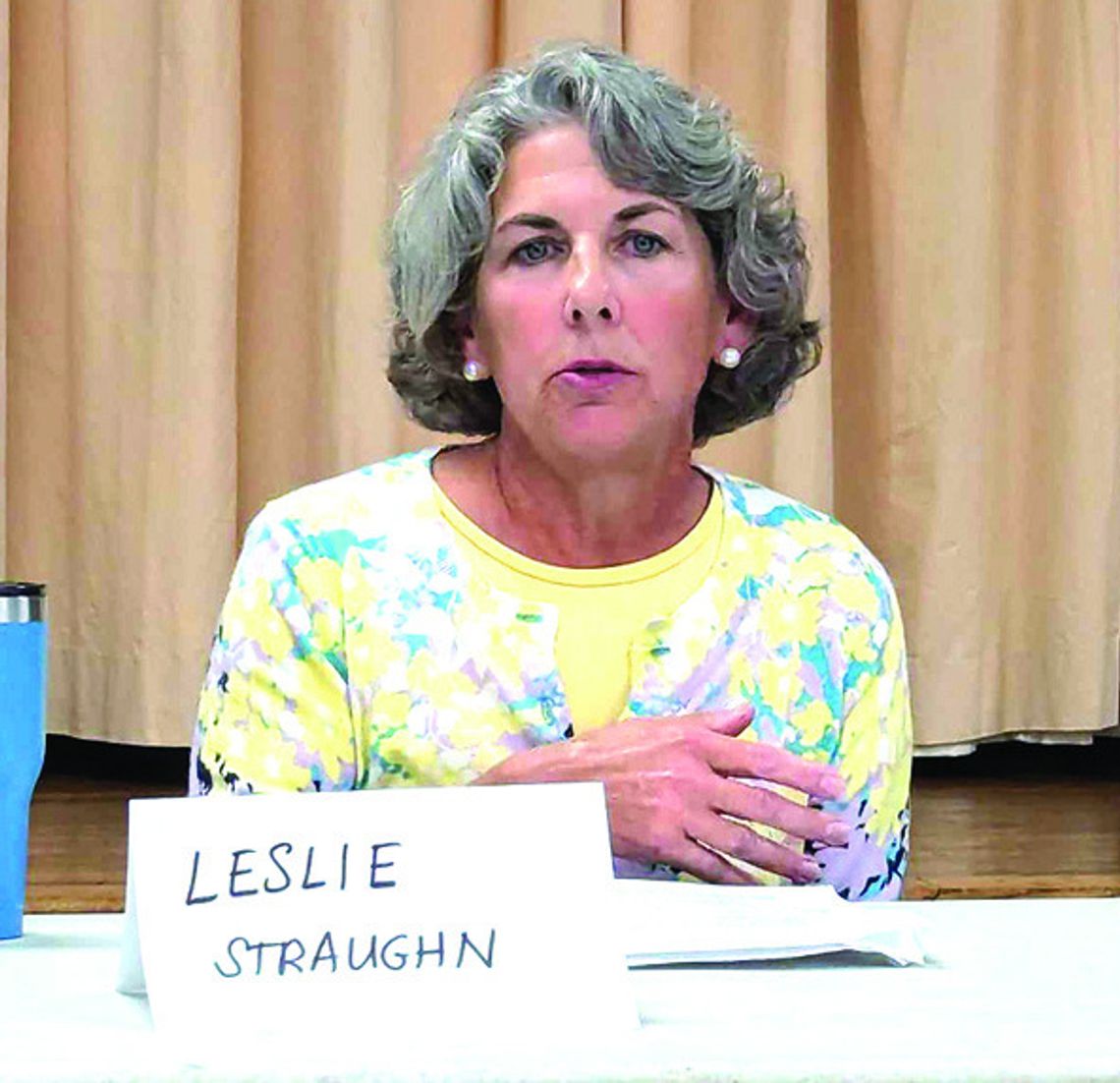Last week, Lexington residents had an opportunity to hear where the four candidates vying for three City Council seats stood on several issues impacting the city.
City Council candidates Leslie Straughan, Madeline Robinson, John Driscoll and Marilyn Alexander participated in a forum hosted by 50 Ways Rockbridge last Wednesday in the parish hall of Grace Episcopal Church. The forum was streamed over Zoom and recorded so that anyone who was unable to attend or watch it live could watch it later.
Staughan and Alexander are both running for reelection, seeking a third and fifth term, respectively. Robinson and Driscoll are running for what would be their first term on City Council.
The first question posed to the candidates concerned the costs for the water and sewer infrastructure modernization that is proposed for the Maury Service Authority, as well as the city’s own infrastructure. The candidates were asked how they would pay for these projects – which are estimated to cost between $60 million and $90 million over the next 20 years – without raising water rates.
Straughan and Alexander both noted that the money paid to the city in water and sewer fees are put into a utility fund, and the money within that fund is used to pay for repairs to the water and sewer systems. That has largely worked over the years, but there is currently not enough money in the account to pay for the repairs needed at the MSA. Alexander said that the city has worked with Davenport, a Richmond-based investment company, to develop plans and strategies to allow the city to pay for several upcoming capital projects, including the MSA updates. The proposed course of action, which the city approved last fall, was to set the city’s unassigned fund balance at 40 percent of the general fund balance and to set aside anything in the unassigned fund above that number into a capital reserve fund to be used for these projects. The city may also borrow some money to help cover the costs of these projects.
“It’s typically a last resort to increase your real estate taxes,” Alexander said. “There are no promises here, but it hasn’t been necessary for years, [and] it’s never our first option.”
Straughan said that it was important that the city pay for as much of these projects from the utility fund as possible for two reasons: one, all of the water users in the city pay into the fund, which lessens the individual burdens toward the costs, and two, the more of the projects that the city is able to pay for with its own funds, the better the rates will be if and when they need to borrow money for these projects.
Robinson noted that, in her conversations with the city manager in preparation to run for Council, she feels that the “unfortunate reality is that rates are likely to increase, regardless of city action.”
“The reality is that the city’s water and sewer structure is old and needs to be replaced,” she said. “This is a large capital improvement project that we’ve been sitting on for a while that we really do need to invest in.”
The MSA is currently estimating $25.5 million in repairs over the next five years, and another $38 million for projects beyond that. Additionally, the city is estimating $13 million in repairs on its water and sewer system.
She proposed the city look at federal relief funds, such as the “tens of billions of dollars” that were included in the 2021 Bipartisan Infrastructure Bill for infrastructure improvements in rural communities.
Driscoll also noted that the water rates were likely to increase, and that the Davenport study had estimated an 8 percent annual increase in water rates over the next decade. Minimum bills for city residents are currently $44, and with the 8 percent increase each year, the minimum amount would more than double to $95 in 10 years.
“We need to consider the combined cost of utilities and fees, especially for cost-burdened households, and are there ways that we can provide relief,” he said. “That could be through property tax relief [or] that could be through energy savings and other programs that may be available.”
The Budget Surplus
The candidates were then asked about how the city should spend the current budget surplus that it has, as well as the remaining $5 million in federal Covid relief funds that it hasn’t spent yet.
The candidates noted that there are a number of capital projects planned for the next several years that are going to take priority – the city has identified $24 million in projects over the next five years and another $29 million in projects coming after that – but they did have suggestions on how to invest any funds that may be left over beyond those capital improvements.
Driscoll said he would encourage adding to the rainy day fund and “using a portion for quality of life improvements such as sidewalks.” He also suggested hiring consultants to help the city enact some of its housing initiatives.
“Our current staff are doing a good job, but they have many obligations and demands on their time,” he said.
Alexander and Robinson both said they would invest in social services for the residents, such as child care. Straughan said she would like to see any excess funds be put toward implementing the Jordans Point Park master plan.
“Our public works department has done a fabulous job of starting to do some of those projects, but we’re getting into bigger projects and they need more funding, so for me, that would be a priority,” she said.
On Housing
Moving away from financial planning, candidates were next asked if they were in favor of increasing housing density in the city.
Robinson and Driscoll both stated they were in favor of increasing housing density for the city. Robinson noted that there are a wide array of groups affected by the limited housing options currently available in the city, from older residents looking to downsize to young families wanting to move to the area to families who have lived in Lexington for generations who are having to leave due to costs increasing.
“All of these groups – everyone in town – would benefit from a more forgiving buyer and renter market,” she said. “We’ve got high rents, mortgage rates are really high, and our inventory is low, particularly for single-family homes.”
“We can’t be afraid of increasing our housing density,” she continued. “I really do believe that it can be done tactfully without impacting the historic nature of the town, and I think it must be done to provide opportunities for our lower-income families and individuals who want to live here in Lexington.”
Driscoll noted that the city’s comprehensive plan, which was approved in 2020, calls for a “wider variety” of housing options, and that over the last several years, he has worked as a member of the Planning Commission on several ordinances to help expand housing options within the city, including creating a Planned Development-Mixed Use zoning district overlay for the city’s entrance corridors on East Nelson and South Main streets and an ordinance to allow detached accessory dwelling units within the city. The Commission is currently working on drafting an ordinance to allow cottage housing developments.
“We’re moving in the direction of improving the supply of housing,” he said.
Alexander said that she is a “very cautious proponent” of increasing the city’s housing density, noting that increasing the number of people living within the city will create challenges, from increased traffic on the narrow streets to parking challenges to potentially increasing the classroom sizes at the city schools.
“The bottom-line [is that] matters that can negatively impact our citizens must be seriously considered,” she said. “We must have that willingness to say no when the situation doesn’t fit. And some of you might recall that I’ve had to be that person before.”
Straughan agreed with all three of the other candidates, saying that she felt he city is “on the right track” with its efforts to increase housing and “we’re very cognizant of the issues” that Alexander referenced. Straughan serves as the Council’s representative on the Planning Commission and worked on the ordinances that Driscoll referenced.
“We have been slow and strategic with the ordinances we’ve been coming up with to provide various housing options, and I think that’s the right track,” she said.
She also pointed out that there isn’t much undeveloped land in the city, so increasing the density wouldn’t add too many new houses. The best options for development currently are the Spotswood and VDOT properties, both of which are currently under contract with Echelon Resources.
‘Institutional Creep’
On the issue of ‘institutional creep,’ all four candidates expressed a desire to find a solution that keeps the feel and look of downtown Lexington intact.
“Our guiding principle should be, ‘Is this a win for Lexington?’” Straughan said. “We don’t need to worry about if it’s a win for W&L, but is it a win for the city? …We are a two college town, so we have to remember that, but Lexington has its own character, and we want it to look like Lexington, not like either of our two universities.”
“The question of renting property downtown has more to do with what we want Lexington to look like than how it impacts our tax base,” Robinson said.
“As a city, a healthy and diverse downtown is essential to our residents, our visitors, our businesses, our merchants and our institutions,” Driscoll said. “I’ve been advocating for a public forum on this topic because all of the issues that have been mentioned are good ones to be debated, and I’ve also been an advocate for developing a MOU (memorandum of understanding) with W&L to guide the university uses outside of campus.”
“Balance is key, and our comp plan is clear about our needs for our downtown being varied to allow for a thriving economy,” Alexander said. “Our council must respond to the needs of our institutions, but more importantly, we must pay attention to the needs of all of our citizens who deserve a vibrant downtown seven days a week, seven evenings a week, seven nights a week … Filling the needs of our community is a priority.”
Conflicts Of Interest
Candidates were next asked if the current guidelines regarding conflicts of interest were sufficient in alleviating concerns over the appearance of conflicts.
Alexander noted that the guidelines were established by the state code and the city isn’t in a position to change them, whether some feel they go farther than is necessary or that they aren’t strict enough.
“Even when we feel we know the answer to a conflict issue, we want to be sure there are no questions from the public, among ourselves or from our staff about any impropriety,” she said. “We typically consult with our city attorney whenever there’s even a hint of perception versus reality. Those two characteristics are really what’s always at issue.”
Straughan said that she felt that, as long as a member of Council didn’t have a conflict according to the state’s guidelines they shouldn’t be required to recuse themselves, even if there is the appearance of a conflict of interest.
“I know some people feel like you should recuse yourself if there’s any appearance whatsoever [of a conflict of interest], and I will say that I disagree with that.” She said. “I do feel like any time one of our Council members is missing from a discussion that the discussion is not as robust. There are six of us plus a mayor, and we all represent different perspectives and we were elected to represent those perspectives. So I do think that it’s important to participate. It’s in our city code that we should participate unless we have a conflict of interest or are excused.”
Robinson advocated for transparency from Council members, saying they should address and acknowledge a potential conflict of interest on the record in the meeting, which she says the current council does quite often.
“I’m of the opinion that when you’re in a position of trust with the public, you really owe it to everyone who had an opportunity to vote for you to continuously err on the side of caution when it comes to apparent conflicts of interest,” she said. “I’m really a big fan of transparency, as often and as publicly as possible, to ensure that trust, because I think our government works a lot more effectively and a lot more happily when people have trust in us.”
Driscoll noted that Council discussed this very issue last year in regards to removing language from the city’s code of ethics that required members of council – as well as the many boards and commissions – to recuse themselves if there was even an appearance of a conflict of interest. That requirement was ultimately removed from the code of ethics to bring it in line with the state code.
“While I preferred the language from before about appearances of conflicts of interest, it makes sense that we’re in sync with the state code,” Driscoll said. “As board, commission and council members, we can still recuse ourselves, even if there’s an appearance of a conflict or we disagree with the advice of the city attorney. What’s essential is that the individual member must declare their intention, and that must never be forgotten.”
Shared Contracts
Discussion then turned to the numerous shared contracts with Buena Vista and Rockbridge County, and whether any needed to be reconsidered or revised. While none of the candidates said any needed to be revised, they were all in favor of regular reviews of the agreements, and amending them as needed.
Driscoll noted that Lexington has 48 different agreements with the county and/or Buena Vista for a variety of things, including the Rockbridge Regional Library, Rockbridge County High School, the Rockbridge County Courthouse, and the Rockbridge Regional Jail. All of these agreements, he said, “bring amenities to our community that we couldn’t otherwise afford or manage individually.”
“I did a lot of research in my previous life on shared service delivery, and generally it helped to reduce costs and improve service quality,” he said. “But like any agreement, they should be periodically reviewed to see if the original intent is still valid and matches today’s needs, and if the representation structure is fair. Agreements that include cost sharing especially need review to ensure that there are no financial surprises coming up in the near future. I think, with the new city manager in place, now is a good time to review these agreements with the relevant stakeholders and do this systematically in the coming years.”
Robinson added that only 12 of those agreements have dates within the last 10 years and that 11 of them “are older than I am.”
“It’s well past due for us to review these contracts, but that is not the same as revising all these contracts,” she said. “We need to select the contracts that are most important to us right now, particularly as it relates to cost sharing in our area. I would also say, considering the capital improvement projects we were discussing earlier, that we should probably revisit and make sure the terms of the contracts about water use, sewer [and] infrastructure are meeting the needs of our town and our constituents.”
Alexander advocated for reviewing the agreements “on at least a biannual basis.”
“To be fair to all of them, I would say they should be reexamined on a regular basis and ask questions of them then,” she said. “I can say that it’s always helpful to have those courageous conversations, but when it’s necessary.”
Straughan said that communication between the partners can help resolve any issues that may arise with the agreements.
“When we do have an issue with any of the agreements, what I’ve found to be the most effective thing is just meeting with the other parties and discussing what the conflicts are,” she said. “You may not necessarily need to rewrite the agreement to get what you want.”
“I think you also have to avoid the ‘winner and loser’ mentality,” she added. “When it comes to these regional agreements, it really is about what’s best for our community and sometimes that’s a hard place to get.”
Other Issues
For the final question of the evening, the candidates were asked what pressing issues they wanted to address as a member of Council.
Robinson said that she feels that “it’s time for the city to address public transportation and affordable housing.”
“Not everybody in this town is privileged or affluent, even though we may have the appearance of a particularly affluent town,” she said. “My family, since living here, we have used Social Services. We have been to RARA and gotten food from the food bank. We have need here in this community that is significant and we need to invest in things like our public transportation and our affordable housing or lowto moderate-income housing. Along the same vein, we need to look at childcare and government social supports to encourage people to come to this city and build their lives here as my wife and I have been doing.”
Driscoll offered two shortterm proposals – continuing the city’s conservation efforts and beginning to implement the bicyclepedestrian plan by “developing a three-year program that’s tied to our capital investments.” He also advocated for a focus on longterm planning for the city.
“We would benefit from longterm strategies for managing our growth and development. We’re too reactionary in our ways that we govern ourselves. We have the tools – we have the comprehensive plan and the council’s strategic plan. Both plans are now over five years old, and with a new city manager in place, now is an excellent time to update and, what I used to call in the business, align the plans.”
Alexander listed several issues that she felt are pressing, including addressing institutional creep, cleaning up overgrown alleyways that are not owned by the city, and addressing issues in the Diamond Hill and Green Hill areas of the city including addressing party houses and dilapidated houses in those neighborhoods.
For Straughan, the biggest priority is to “not lose focus on the infrastructure and long-term capital needs” as well as the development of the Spotswood and VDOT properties.
“We need it to answer several of these questions,” she said. “We need it to expand our tax base, we need it to supply the needed housing and we need it to increase our water users.”








